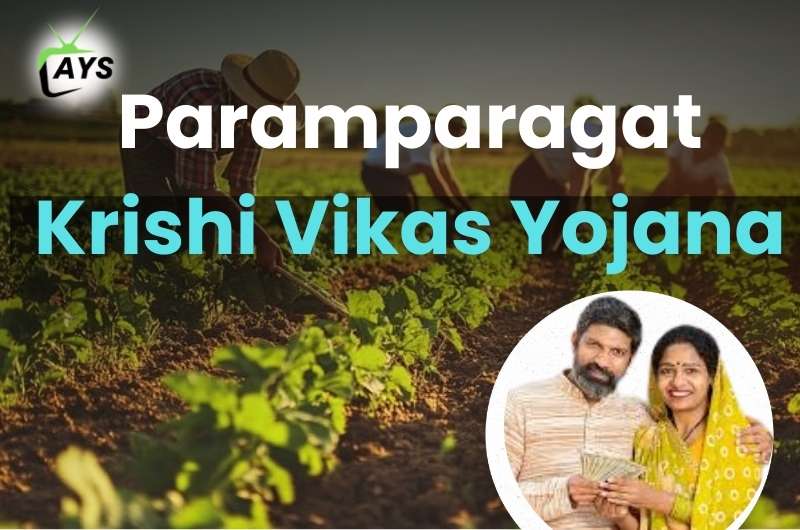


Paramparagat Krishi Vikash Yojana

- By agriyouthstory
- (0) comments
- April 2, 2025
Paramparagat Krishi Vikash Yojana
Introduction:
The Paramparagat Krishi Vikas Yojana (PKVY) launched in 2015, is an extended component of Soil Health Management (SHM) under the Centrally Sponsored Scheme (CSS), National Mission on Sustainable Agriculture (NMSA). The program aims to protect the environment, empower farmers, and lower the cost of agriculture.
Objective:
By implementing affordable, environmental friendly methods, the objective is to produce agricultural goods devoid of chemical and pesticide residues. PKVY’s primary focus areas in advancing organic farming are as follows:
1. Encourage young people living in rural areas to grow their own organic food and to become consumers, dealers, and farmers. Spread the newest technologies for organic farming.
2. Make use of the services of professionals from India’s public agricultural research system.
3. Plan a minimum of one village cluster demonstration.
Components:
The PKVY provides assistance for various components, including:
1. Integrated processing units
2. Collection, aggregation, and grading units
3. Integrated pack houses
4. Refrigerated vehicles
5. Pre-cooling, cold stores, and ripening chambers
6. Transportation and 4-wheelers
Major Features of the Scheme:
• The cluster chosen for Organic Farming shall be 20 ha or 50 acres in extent and in as contiguous a form as possible.
• Total financial assistance available for a 20 ha or 50 acres cluster shall be a maximum of Rs. 10 Lakhs for farmer members and Rs. 4.95 Lakh for mobilization and PGS Certification with a subsidy ceiling of one hectare per farmer.
• Of the total number of farmers in a cluster, a minimum of 65 % farmers should be allocated to small and marginal category, to be fulfilled at cluster level as far as practicable and where not possible to be satisfied at Mandal/Block/ Taluka or District level.
• At least 30% of the budget allocations need to be earmarked for women beneficiaries/ farmers.
Benefits of the PKVY Scheme Include:
1. Better soil health: Soil health is improved by organic farming.
2. Chemical-free produce: The program attempts to grow wholesome food free of chemical residues and pesticides.
3. Market access: The program facilitates farmers’ access to regional and national markets.
4. Increased revenue: By lowering expenses and enabling farmers to sell their produce at greater rates, the program seeks to boost farmers’ revenue.
5. Empowered farmers: The program assists farmers in creating organizations of their own, such as groups and clusters, to oversee certification, processing, and production.
A sub-mission of the National Mission on Sustainable Agriculture (NMSA), Bharatiya Prakritik Krishi Paddhati (BPKP) is part of the Paramparagat Krishi Vikas Yojana (PKVY), this is introduced in 2020-21 that main objective is to enhance organic farming.
BPKP aims at promoting traditional indigenous practices, which give freedom to farmers from externally purchased inputs. It focuses on on-farm biomass recycling with major stress on biomass mulching; use of cow dung–urine formulations; and exclusion of all synthetic chemical inputs either directly or indirectly.
The program, which would cost a total of Rs 4645.69 crore over six years (2019–20 to 2024–25), will be conducted in accordance with the Centrally Sponsored Scheme (CSS) standards and on a demand-driven basis. With the goal of covering 12 lakh ha in 600 large blocks of 2000 hectares in various states, BPKP offers financial assistance of Rs 12200/ha for three years to support cluster creation, capacity building and ongoing hand holding by trained professionals, certification, and residue analysis. Under the PGS India program, the plan complies with PGS-India certification. The eight states that have chosen to participate in the initiative are Andhra Pradesh, Chhattisgarh, Kerala, Himachal Pradesh, Madhya Pradesh, Odisha, Tamil Nadu, and Jharkhand. ICAR has constituted a committee for developing the syllabus of Natural farming in undergraduate and postgraduate level.
Eligibility:
All farmers/institutions are eligible to apply. However, the maximum land holding is 2 ha.
Application process (Offline):
Step1: For interested applicants to get in touch with the state’s regional councils.
Step 2: Regional councils create an annual action plan after compiling all of the applications.
Step 3: The Ministry of Agriculture & Farmers Welfare receives the state’s regional councils’ compiled annual action plan.
Step 4: The center releases funds to the states
Step 5: Additional funding is made available to local governments to farmers/ individuals.
Documents Required:
Aadhaar number, land documents, caste certificate (SC/ST/OBC only), phone number and bank details. The specific documents for availing the benefits of the program may vary depending on the type of intervention and the state. It is recommended to consult with the relevant authorities for detailed information on documents to be submitted.
For further information, visit the official website: https://pgsindia-ncof.gov.in

